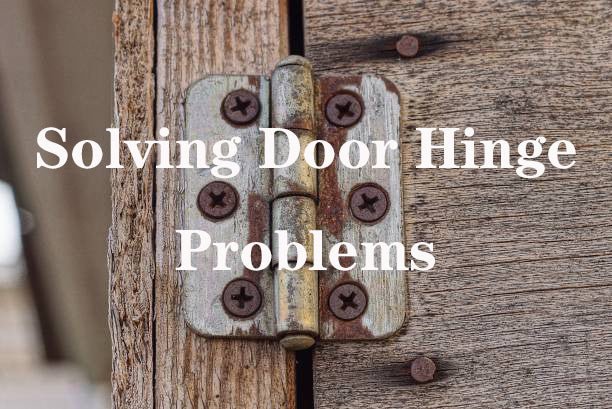
When a door hinge starts to scratch, it could be due to various reasons, ranging from lack of lubrication to misalignment. Think of it as your door’s way of saying it needs a little TLC. Just like how we need a good stretch or a quick tune-up to keep moving smoothly, your door hinge requires proper care. In this guide, we’ll break down how to troubleshoot a scratching door hinge and help you understand how to get it back to functioning quietly.
Why Is My Door Hinge Making A Scratching Sound?
You might be wondering why your door hinge is making such an awful noise. The scratching sound typically means something isn’t right. Here are a few common causes:
- Lack of lubrication: Over time, the oils that keep hinges moving smoothly can wear off. Without this lubrication, metal can grind against metal, causing that irritating scratch.
- Misalignment: If your door isn’t hung correctly, the hinge may not sit in the right position, leading to unnecessary friction. It’s like a shoe that doesn’t fit properly—it just doesn’t work as it should.
- Rust or corrosion: If you live in a humid area, your hinges might develop rust. This can result in rough patches that produce noise when the door opens and closes.
Understanding these issues is the first step to solving the problem. Neglecting these sounds can lead to more significant door issues down the line, so let’s get to work!
How to Identify the Source of the Scratching Sound
Before diving into fixes, let’s pinpoint the source of that annoying sound. Here’s how you can identify what’s causing the scratching:
1. Open and Close the Door Slowly: Listen carefully as you move the door. If the sound is loudest near the hinge, you’ve likely found the culprit.
2. Inspect the Hinge: Check for any visible damage, rust, or debris around the hinge. A quick visual can often reveal if it’s dirty or rusty.
3. Look for Misalignment: Stand at eye level with the hinge and look to see if the door is hanging straight. If it’s tilted or doesn’t close properly, alignment may be an issue.
Taking these steps can save you time and effort when it comes to fixing your door hinge. Once you know where the sound is coming from, you can determine the best course of action.
How to Lubricate Your Door Hinge
If a lack of lubrication is the issue, it’s a straightforward fix! Here’s how you can easily lubricate your door hinge:
1. Gather Your Supplies: You’ll need some lubricant spray (like WD-40), a cloth, and possibly a screwdriver if you need to remove the hinge.
2. Clean the Hinge: Wipe the hinge with the cloth to remove dirt or debris. This will help the lubricant penetrate more effectively.
3. Apply Lubricant: Spray a small amount of lubricant onto the hinge, focusing on the moving parts. If the hinge is particularly squeaky, don’t hesitate to give it a generous spray.
4. Open and Close the Door: This helps the lubricant spread evenly throughout the hinge. Listen carefully—hopefully, the scratching sound will be gone!
Lubricating your hinge can work wonders, but if the sound persists, you might have to consider other fixes.
Adjusting a Misaligned Door Hinge
If the hinge is misaligned, fixing this issue can take a little more effort, but it’s worth it. Here’s how to adjust a misaligned door hinge:
1. Identify the Screws: Look at the hinge to find the screws holding it in place. You typically have two or three screws.
2. Tighten Loose Screws: Use a screwdriver to tighten any screws that are loose. Sometimes, this simple step can solve the alignment issue.
3. Adjust the Hinge Position: If tightening the screws doesn’t help, you might need to unscrew the hinge completely and reposition it slightly. This may involve adjusting the door itself to ensure it hangs straight.
4. Reattach and Test: Once you have the hinge in the correct position, reattach it, and test the door. Is it still scratching? If not, you’re good to go!
This process can be a bit tricky, especially if you’re dealing with heavy doors. Don’t hesitate to reach out to a friend for help or consult a professional if needed.
Dealing with Rusty Hinges
If rust is the problem, you can take a few extra steps to clean and protect your hinges:
1. Remove the Hinge (if necessary): If the rust is severe, you may need to take the hinge off the door. Use a screwdriver to do this carefully.
2. Clean the Hinge: Use sandpaper or a wire brush to remove rust. Make sure to clean all nooks and crannies.
3. Apply Rust Inhibitor: Once clean, you can apply a rust-inhibiting spray to protect the hinge from future corrosion.
4. Lubricate as Usual: After you’re done cleaning, don’t forget to lubricate the hinge as we discussed earlier!
Addressing rust can significantly improve the lifespan of your door hinges and keep them functioning as they should.
When to Replace the Hinge
Sometimes, troubleshooting just doesn’t cut it. If you’ve tried lubricating, adjusting, and cleaning without success, it might be time for a replacement. Here’s what to consider:
1. Signs of Severe Damage: If the hinge is bent, cracked, or completely rusted through, it’s time for a new one. Continuing to use a damaged hinge could make future repairs more complicated.
2. Cost-Effectiveness: Sometimes it’s more cost-effective to replace the hinge than to keep repairing it, especially if it’s an older door.
3. Access to Replacement Parts: If you can’t find the same type of hinge, it may be a sign to switch to a standard option, which could be easier to maintain in the long run.
Replacing a hinge is a straightforward task if you’re handy, but calling a professional is always a good option if you’re unsure.
Preventing Future Scratching Sounds
Once you’ve tackled the scratching sound, let’s talk about prevention. Here are some tips to keep your hinges quiet:
- Regular Maintenance: Make it a habit to check and lubricate your hinges every six months. Prevention is easier than cure!
- Keep Doors Clean: Wipe down your doors to remove dirt and grime. This will help minimize wear on the hinges.
- Opt for Quality Hinges: If replacing hinges, consider investing in higher-quality options that are less prone to rusting and wear.
By taking these steps, you can enjoy peaceful, quiet door operation without the scratching interruptions.
In summary, while a scratching door hinge can be annoying, it’s often a sign that it just needs a little attention. From checking for misalignment to applying some lubricant, you have the tools to tackle the problem yourself. Remember, your door hinges do a lot of work, and giving them proper care can save you from more significant issues later on. Happy fixing!
